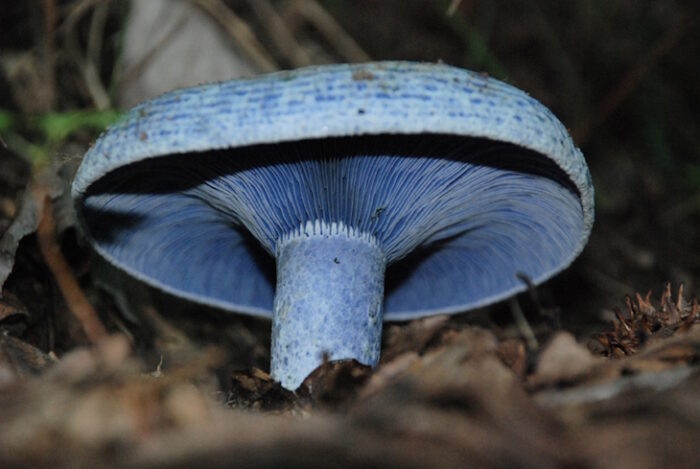On a sun-splattered path through a stand of birch,
we walked back to his hermitage for tea, but an Indigo
Milk Cap caught his eye and he stopped,
and brought the earth to his knees.
His face drew close to that universal veil, and he touched,
so lightly,
the stipe and wreath, the cream-smooth cap,
and the indigo gills beneath.
And after a long moment he rose to his feet
and said, “I exhaust myself with seeing,
and all I can do is plead ignorance
for all that I’ve overlooked.”
So I picked up a birch leaf and studied,
with as much intensity given me, its heart-like body,
its pale-straw colouration, its saw-toothed verge,
the hand-fan of veins, the faint curve
of stem, and all I could utter, was,
“Looking at something is not easy.”
We had come from the Office of Lauds,
where the Gospel reading was the parable
of the splinter and log.
So it is,” he said, “when I’m convinced I understand,
there my thinking ends.
When I cease my certainty, accept my errancy,
it’s then I begin to see.”
And on that path beneath those trees, I stood;
each falling leaf, a clanging reproach,
every soft and gentle landing,
a wrenching censure,
exposing my reflexive ranking of others.
And I pleaded, “Why can’t I learn a wide
mercy, love relentlessly, live fearlessly,
beyond all bias and prejudice?”
“Never mind that,” said Father James. “Go low
to the mushroom, taste the glittering wood moss,
face the ground and listen, to the fall leaves fall,
then follow your desire back to the city,
a small branching light will lead you.”


Oh, my, Stephen, such rich imagery. I am with you on the path, now your own nose to the mushroom and the fecundity in which it grows. Your question,“Why can’t I learn a wide mercy, love relentlessly, live fearlessly, beyond all bias and prejudice?” Maybe it takes a lifetime of desire and openness, and failing and trying again, to be changed completely into the love of God. Thank you for this. And for the images!
Thank you, Ann! Indeed, it does take a lifetime.
Such a powerful poem, asking such important questions. Thank you for this “small branching light.”
Thanks so much, Dan!
“I exhaust myself with seeing,
and all I can do is plead ignorance
for all that I’ve overlooked.”
I feel this every time I interact with creation… nature and humanity.
I’m still catching up after all those distracted years!
Thank you.
Thanks for this Kellie, I know what you mean. Here’s to redeeming the years.
I just came from therapy this afternoon. I too am struck by our question “Why can’t I learn a wide mercy, love relentlessly, live fearlessly, beyond all bias and prejudice?” As a woman healing from fear—as a person considering Gaza and Israel— wide mercy and fearlessness seem worthy of all the prayer in the world.
Thank you, Shannon, for sharing this.
Good god, Stephen, the language inside this … breathtaking.
I particularly love: ‘brought the earth to his knees’
and ‘each falling leaf, a clanging reproach’
Also: ‘love relentlessly, live fearlessly’ should be a bumper sticker
You are a very kind, my poet friend. Thank you for your encouragement.
I am forever grateful to my mother, who looked and saw and pulled her children out of bed to witness the world – the marmot who took up residence in a pile of logs beside our house, the irises that bloomed on the edge of the bog, the hummingbirds who loved her perfume. Oh that we may look upon those around us with the same awe and respect.
Lovely thought and aim, thank you, Marcia.
Hi Stephen.
Thank you for the poignant reminder to wake up and be mindful. It is timely.
I love the reference to our friend and mentor James Gray and the line, “….and he stopped and brought the earth to his knees.” A captivating twist that I have been reflecting on.
I have pictures of the very path you describe and will send them by email.
This poem reminded me of the Arabic Proverb:
He who knows not, and knows not he knows not. He is a fool; shun him.
He who knows not, and knows he knows not. He is simple; teach him.
He who knows, and knows not he knows. He is asleep; wake him.
He who knows, and knows he knows. He is wise; follow him.
Thank you so much for this, Sheldon. (I have several lovely pictures of that path.)